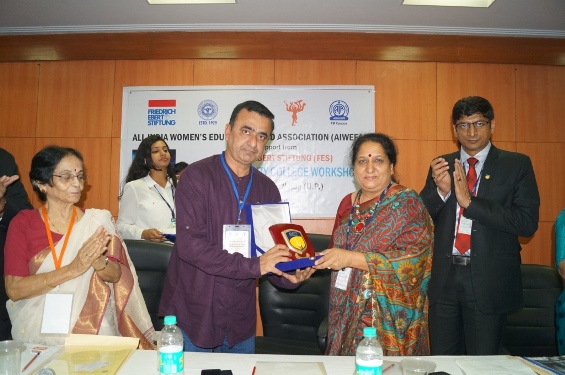28 Aug 2015|Noida | F3 Seminar Hall
“Mostly young predators are found committing Cyber Crimes”, says Mr. Rakshit Tandon, Advisor -Cyber Crime Unit of Uttar Pradesh during Workshop at Amity

Tocreate awareness amongst students on inherent vulnerabilities and emergingthreats associated with cyber world, Amity University in association with AllIndia Women’s Education Fund Association (AIWEFA) organized a day Workshop onCyber Security at Amity University campus, Sector 125, Noida.
Theaim of the workshop was to generate mass awareness on Internet, Cyber Securityand Cyber Ethics amongst the youth, enabling them to be responsible citizensand participate safely and securely in Information society.
Theworkshop was inaugurated by Mr. Rakshit Tandon, Advisor -Cyber Crime Unit ofUttar Pradesh Consultant- Internet and Mobile Association India; Mrs. AshaChandra, AIWEFA President; Mrs. Sarla Manchanda, AIWEFA Secretary; Dr. (Mrs.)Balvinder Shukla, Vice Chancellor, Amity University Uttar Pradesh; Prof.Marshal Sahni, Dean Student Welfare and Dr. Abhay Bansal, Jt. Director, Amity School of Engineering and Technology.
Sharinghis views on Cyber Security, Mr. Rakshit Tandon said that there arevarious threats and challenges in the digital era as the number of cyber crimeshave been increasing drastically over the years. He pointed that there are 302million internet users and 173 million Mobile Internet users. In year 2008, thenumber of cyber crime incidences reported were 2565 which augmented to 1,60,000by year 2014. He stressed that in the present era of information and technologydeluge wherein social media is easily accessible to all especially young mindsit is important to educate the youth on cyber ethics, cyber hygiene andnetiquettes than moral science because as per NCRB study 2014, 143 people werearrested under cyber crime who were below 18 years and 2782 were between 18 –30 years. He mentioned the fact that youngsters who were caught for the cybercrime were not aware of the crime they committing highlights their low level ofknowledge about cyber related crimes. He remarked that the young generation isnot knowledgeable about the difference between ethical hacking and unethicalhacking. He added that if a person finds a bug in a website and misuses it thenhe or she is practicing unethical hacking. Mr. Tandon apprised that in digitalworld, once you upload something then it remains forever even if you delete itas it can be easily retrieved by hackers. He informed that Secure Coding is theforthcoming profession in the industry which will be in high demands for cybersecurity. During the workshop, Mr. Tandon highlighted information pertainingemail security, social media security, mobile safety tips, prevention againste-frauds and smart surfing.
Enlighteningthe students on cyber security issues, Mrs. Asha Chandra said that thedigital world of easy connect and information excites many especially theyoungsters but it also lures them into cyber issues. She further added that itis imperative to keep abreast with cyber developments as it is rapidly updating.She appraised students with the major types of reported cyber crimes includingCyber Defamation, Cyber Stalking, Email hacking, Vishing/Phishing, Mobilecrimes, Hacking/Defacement of Websites, DATA Theft and E-Frauds amongst others.Mrs. Chandra emphasized that these days young people are involved in cyberbullying without realizing that it is a crime. She outlined that a simplescreenshot have become a source of bullying. She mentioned that in keeping withPrime Minister Modi’s initiative ‘Digital India’, AIWEFA is organizingNetiquette campaign wherein during the first phase, 100 workshops will beconducted in colleges/institutes/schools and in the second phase, 100 workshopswill be conducted for Corporate and RWAs.
Addressingthe gathering, Dr. Balvinder Shukla said that presently, people areliving in an online world and individual lives are dependant on technology. Shestressed that youngsters use the Internet as much, and in similar ways, asadults but they also often engage in risky behavior such as cyber bullying andstalking. She apprised that there is an age limit for access on social mediawebsites or certain content such as 13 years + for Facebook and 16 years + forWhatsapp. She urged that youth should be informed about the risks associatedwith cyber world and visiting sketchy websites or creating fake profiles. Dr.Shukla avers that parents must make sure that computers or mobile devices usedby their children are equipped with good security software and they arefamiliar with legitimate ways to surfing and accessing websites/content.
Duringthe workshop, Cyber Security Flame was lightened by the speakers and the batonwas passed to Vice Chancellor, Amity University Uttar Pradesh The workshop wasattended by around 200 students, faculty and staff of Amity University.